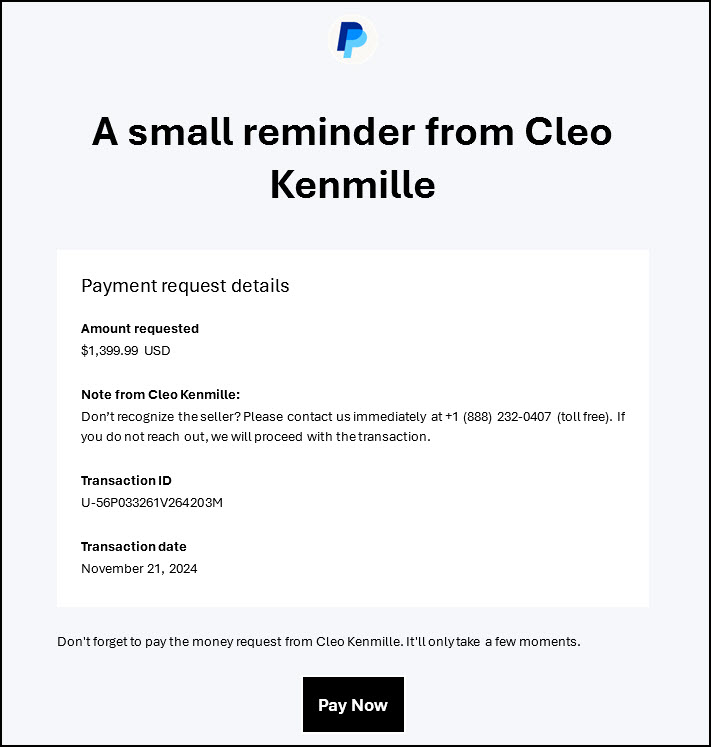
Have you heard from “Cleo Kenmille” or “Caroline Johnson”? If not, consider yourself fortunate. Those are pseudonyms used by a crew of shitbags who work out of bucket shops that lie beyond the reach of international law. Their job is to steal money from you or anyone else who is familiar with PayPal, the online banker. Paypal itself is unconnected to the scam, although its familiar logo is used to entice the unwary (see above). The header on the scammer’s email — “A small reminder from Cleo Kenmille” — should arouse the suspicion of anyone who is even slightly wised-up about phishing scams. Since when did banks start sending out emails featuring in the headline the specific name of an individual to whom you or I supposedly owe money? This email did, though, explicitly identify “Cleo Kenmille” as the aggrieved party. The implicit message is: “Pay her now!”
Or…what? Although that question begs a stupid answer, someone might absent-mindedly fall for this grift, since the email cautions the recipient to call 888 232-0407 if he or she doesn’t recognize Cleo’s name. A friend of mine dialed the number and was connected to a surly man with an Indian accent. He somehow persuaded my friend to download an app that promised to “get this mess straightened out”. Next thing you know, she was logged onto a phony PayPal site that listed several Bitcoin transactions, including one for $98,000. Nervous and distressed, she hung up. But not before she’d given the thieves enough information to enable them to generate a very real message in her Charles Schwab account concerning a “pending” $130,000 wire transfer of her savings to a bank in Dubai. My friend immediately instructed Schwab to lock the account, changed a bunch of passwords, and then waited for the other shoe to drop. It didn’t, presumably because the scammers would have needed one more phone conversation to trick her into releasing the funds.
Global Crime Wave
If you are a frequent internet user, you’ll already know that the World Wide Web has helped spawn a global crime wave so pervasive and persistent that one might suspect there are many millions of scammers in our midst. Search the retail sector, for one, and you’ll be challenged to find more than a handful of categories that are not dominated by crooks, cheats, and liars. Craig’s List seems to attract the worst of them, including actual rapists, robbers and murderers. Online dating services are filled with phony profiles, and even Amazon is wholeheartedly on board, lending their coveted ‘Amazon’s Choice’ endorsement to shady companies that sell shoddy merchandise made in China under a score of company names. The makers will typically offer a 30-day guarantee, which of course is when Amazon’s guarantee ends. I discovered after ordering a high-intensity flashlight that stopped working after 30 days that Amazon didn’t even have contact information for the company they had rated so highly.
It is nearly impossible to catch internet scammers, let alone bring them to justice. I offered investigative help to the local police when a scammer advertised a South Florida apartment with a pay-in-advance deal that sounded too good to be true. This was a potential $14,000 con, but the chief of detectives was too busy to be bothered.
The only way to mitigate the 24/7 orgy of fraud on the Internet is to arrest, try and execute a few dozen perps. I’m convinced there would be strong bipartisan support for this — not just among voters, but on Capitol Hill. Track down a slew of these sociopaths and sentence them to die in the electric chair. When enough of them have taken the hot squat, their shitbag colleagues will get the message. The world will be a better place without them.

